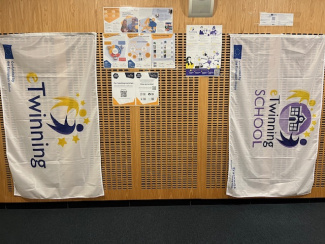Inspiration for prospective and early career science teachers in Poland
In Poznań, a hybrid conference provided teacher education students and beginning teachers with inspiration, tools, and collaboration opportunities. Science on Stage Poland took part in this vibrant event. The speakers included students from the Faculty of Biology at Adam Mickiewicz University in Poznań, its graduates (currently teachers and educators), lecturers teaching STEM and ICT modules in projects at the Faculty of Biology at Adam Mickiewicz University, the National Support Office eTwinning and the European Blue School Network. Around 100 people participated on site, and more joined the livestream of the event. Q&A segments and a networking coffee break supported the exchange of experiences and ideas.
Tomasz Ordza was present to introduce Science on Stage. It was highlighted as a European initiative that provides “living” examples of lessons, experiments, and projects ready for immediate adoption, as well as inspiration and exchange of good practices.
Other topics and presentations included:
- A journey across the oceans – stories, datasets, and teaching tools that help us teach about marine biodiversity and the ocean’s role in climate and life on Earth. Narratives about large marine mammals and the places “where darkness swallows ocean blue” showed how to spark student curiosity and how to use imagery, sound, and maps to build scientific competencies.
- From student passion to classroom practice – pathways from university to school with an emphasis on designing mini investigations, field lessons, and micro STEAM courses that strengthen student agency.
- Science education as a roadmap to understanding nature – planning inquiry tasks, weaving together biology, geography, physics, and chemistry, and crafting research questions that truly carry the lesson.
- eTwinning in STEAM practice – how to build international classroom mini consortia, share tasks, run joint experiments, and merge outcomes into one digital portfolio. Concrete examples showed how to elevate student collaboration to the European level while staying aligned with national curricula.
- European Blue School / ocean literacy – bringing “ocean competencies” into and beyond the classroom: from waterside fieldwork and analysis of datasets (e.g., temperature and salinity) to citizen science microprojects and sustainability actions.
- STEAM as a bridge between formal and non formal education – inspirations from national parks, science centres, and NGOs; how to convert them into lesson modules, long term projects, and competency pathways for the future.

Share this page